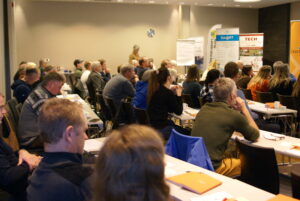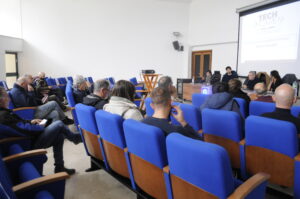– by S. Patsios (ELGO-DIMITRA)
TechCare, a 5-year project funded by the EU H2020 program and led by SRUC, focuses on enhancing welfare management in small ruminant farming through advanced precision livestock farming (PLF) technologies. The project emphasizes the importance of stakeholder consent and involvement throughout the entire value chain of small ruminant farming. Therefore, stakeholders are consulted at each step of the project, following a multi-actor approach strategy, to ensure that the outcomes of the project truly address the stakeholders’ demands and expectations. The 1st and the 2nd series of National Workshops (NWs), which were organized at Spring 2021 and Autumn 2021 – Winter 2022 respectively in all nine countries that participate in TechCare project, reported the opinion of the stakeholders on welfare issues and on PLF tools that can be used in small ruminants farming systems, respectively. The 3rd series of NWs took place in late 2022 and early 2023, focusing on Early Warning (EW) algorithms and applications across all nine countries of TechCare, offering a blend of physical, online, and hybrid formats to accommodate diverse participants’ needs; Table 1 summarizes the data and number of participants for the 3rd series of TechCare NWs. A total of almost 300 stakeholders participated to the 3rd series of TechCare NWs.
Table 1: Overview of the 3rd series of TechCare NWs:
| Country | Organized | Participants |
| GREECE | Physical: 02/11/2022
Online: 24/11/2022 |
10 + 14 |
| ROMANIA | Mixed: 29/11/2022 | 40 |
| ITALY | Mixed: 15/12/2022 | 25 |
| UK | Online: 15/12/2022 | 11 |
| IRELAND | Online: 21/12/2022 | 10 |
| ISRAEL | Physical: 27/12/2022 | 10 |
| FRANCE | Physical (Meat Sheep): 23/01/2023
Physical (Dairy Sheep): 27/01/2023 |
33 + 27 |
| NORWAY | Physical (Meat Sheep): 07/11/2022
Physical (Dairy Goat): 13/04/2023 |
70 + 13 |
| SPAIN | Hybrid: 30/03/2023 | 36 |

The 3rd NWs revealed a strong consensus among stakeholders regarding the need for customizable, user-friendly EW tools tailored to the specific needs of small ruminant farming. In France, participants emphasized the importance of utilizing existing farm data to establish clear thresholds for alerts, advocating for a straightforward alert system that differentiates between urgent and less critical issues. Similarly, stakeholders in Greece highlighted the significance of historical trendlines and expressed the desire for a flexible app that could easily integrate new tools or address emerging welfare concerns. Participants from Ireland and Italy stressed the necessity for data interoperability, including the ability to manually add and compare historical data to improve decision-making processes. Across other countries, additional critical features were identified; in Israel, the focus was on early warnings related to morbidity and inflammation, with an emphasis on tracking animal weight and movements. Norwegian stakeholders highlighted the need for real-time monitoring of individual animal health and behaviour, advocating for a comprehensive EW app that consolidates all data systems. Romania underscored the value of correlating production data with environmental factors, while Spanish participants pointed to the need for welfare assessments covering various aspects such as health and nutrition. In the UK, the desire for an integrated scoring system connected to the EW application was expressed, along with the importance of user-friendly interfaces and effective data management across platforms. Overall, these insights reflect a collective aim to enhance the welfare and productivity of small ruminants through advanced, and easily-accessible EW applications.
The 4th series of NWs took place in early 2024, on the outcomes of Precision Livestock Farming (PLF) tools for small ruminants based on the results from the pilot trials. The 4th NWs took place across seven out of the nine TechCare countries, gathering a diverse group of stakeholders eager to explore innovative solutions for their farming practices. The workshops attracted different numbers of stakeholders, from 9 attendees in Ireland and Israel to 37 in Italy, reflecting varying levels of engagement. Table 2 summarizes the data and number of participants for the 4th series of TechCare NWs.
Table 1: Overview of the 4th series of TechCare NWs
| Country | Organized | Participants |
| FRANCE | 13/03/2024 | 36 |
| GREECE | 24/04/2024 | 17 |
| IRELAND | 21/06/2024 | 9 |
| ISRAEL | 22/05/2024 | 9 |
| ITALY | 30/05/2024 | 37 |
| SPAIN | 18/06/2024 | 18 |
| UK | 02/05/2024 | 10 |

The workshops on PLF tools outcomes from the pilot trials on small ruminants across various countries, highlighted a strong interest among stakeholders in utilizing technology to enhance animal welfare and farm efficiency. In France, farmers expressed a need for specific stress thresholds for sheep and showed keen interest in weight monitoring solutions. Similarly, stakeholders in Greece recognized the utility of weight crates for both sheep and goats, emphasizing the correlation between weight and health. They also mentioned that analog volumetric milk meters are considered more reliable than electronic milk meters, which have a lot of problems. In Ireland, participants pointed out that regular weighing is essential for identifying health issues, particularly in lambs, while also advocating for simpler weighing systems that integrate with existing setups. The discussions across all countries underscored a common theme: while there is enthusiasm for PLF tools, practical concerns such as accessibility, cost, and the need for user-friendly systems remain prominent. In Italy, stakeholders recognized the value of milk meters when paired with other sensors but noted the challenges posed by expensive weigh crates requiring farmers training. Spanish participants highlighted the importance of integrating weather stations with other tools to detect welfare issues, while British stakeholders called for clearer metrics to validate the utility of meta data in sheep farming. Across all discussions, the necessity for technical support in data management and interpretation was frequently mentioned, as well as concerns regarding the compatibility of new technologies with existing systems. Overall, these workshops revealed a collective eagerness to adopt PLF tools, coupled with a need for tailored solutions that consider the specific contexts and limitations of small ruminant farming.
The next series (5th) of TechCare NWs will be organized till the end of 2024 and will be focused on relevant business models concerning PLF tools and EW applications. By the end of the project in August 2025 eight NWs per country will have been organized to maximize the consent of small ruminants’ stakeholders concerning the outcomes of the TechCare project.


© AGRIS
